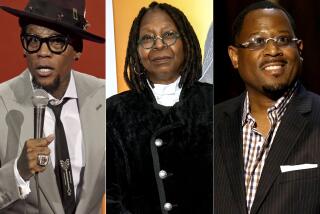New Financial Questions Worsen NAACP Problems : Funding: The latest troubles stem from charges that its board chairman cheated on expenses. He denies the allegations and calls for an audit.
- Share via
BALTIMORE — As the NAACP struggles to recover from the acrimonious firing of its executive director, the organization is confronting unexpected financial questions that are overshadowing the immediate need to find new leadership and a new direction.
If the challenges are not met soon, according to NAACP supporters and outside experts, the financial burdens will snowball and threaten the existence of the organization itself.
Recent financial troubles stem from published allegations by syndicated columnist Carl Rowan suggesting that Board Chairman William F. Gibson may have “double-dipped” on as much as $500,000 on his expense account since 1986, when he assumed his position as chairman. Gibson has denied any impropriety and called for an independent audit of the organization’s top officers to clear the air.
NAACP members who pay dues and, more importantly, the philanthropic groups that make large grants, now express anxiety about whether their money will go toward advancing the organization’s important work--or be used foolishly or squandered by careless executives.
Some individuals and groups are withholding donations, creating a serious problem for an organization that is more than $3.5 million in debt.
“It is rather unfortunate that this large, respected and national organization doesn’t take its financial responsibilities more seriously,” said Dan Borochoff, president of the American Institute of Philanthropy, a charity watchdog organization based in St. Louis.
The NAACP’s sterling image as a crusading civil rights organization may have prevented members and donors from demanding that the organization manage money in accordance with strict financial accountability, he said.
“The problem in this field is that image counts for too much,” Borochoff said. “Everyone should ask questions of these groups--be it the NAACP, the United Way or the Boy Scouts--because all of them have a responsibility to be accountable for the money that people give them.”
Borochoff said that the philanthropy institute has attempted for the last three years to verify and rate the financial stability of more than 300 charities. He said that the NAACP received an A, the highest mark, in 1992. But since then, the institute discovered $3 million in expenses reported to the New York State Office of Charities Registration that did not appear in its federal tax returns.
At best, he said, NAACP accountants were sloppy in their bookkeeping or, at worst, were deliberately misreporting expenses. “Otherwise, they would have reported their information accurately, and we wouldn’t have found these rather large discrepancies.” Borochoff said.
In a quarterly ranking issued last month, the institute rated the NAACP with a “question mark,” indicating that it had not provided adequate or consistent records to the various monitoring agencies, including the Internal Revenue Service, state charities registration offices and other private auditing concerns that check records kept by charities. Borochoff said that NAACP executives have ignored the institute’s requests for additional information or clarification.
Recent allegations of financial misdeeds have coincided with the gravest financial crisis in the NAACP’s 85-year history. The group’s debt now concerns longtime corporate and philanthropic donors so much that some have stopped giving money until they are satisfied that the NAACP has put in place stricter accounting controls.
For example, the Ford Foundation, which helped ease the NAACP’s last financial crisis in 1992 with a large donation, is withholding payment of a two-year $500,000 grant it promised the group. Julio Nunez, a spokesman at the Ford Foundation, declined to comment except to acknowledge that the grant has not been forwarded.
Top NAACP officials convened here last week, in part to plot a course aimed at reassuring the organization’s supporters. Those supporters--ranging from thousands of individual members who pay $15 annual dues to dozens of corporate and philanthropic foundations that contribute millions in grants--provide the bulk of the organization’s estimated $15-million annual budget.
Interviews with some NAACP officials attending the board meeting found no sense of panic concerning the financial problems and a belief that these troubles will pass as have others in the past.
“We will do what is necessary to insure the NAACP’s survival,” said Larry Carter, a board member and vice president of Norwest Financial Inc. in Des Moines, Iowa. “This is not the first time we’ve been in financial difficulty, and I doubt it will be the last.”
In August, the NAACP voted to dismiss Benjamin F. Chavis Jr. as its executive director after many of its directors learned through media accounts that he had approved spending up to $333,000 of the organization’s money to settle a threatened sexual harassment and wrongful discharge suit.
Since then, Rowan, a longtime NAACP member, has rocked the organization in a series of columns that have included calls for Gibson’s resignation. Rowan wrote that documents he obtained suggest Gibson had “double-dipped” since 1986 on his expense reports by requesting reimbursements of more than $500,000 in charges on his association-provided American Express card, including business-related airline travel, hotel expenses, car rentals and personal items.
So far, the NAACP has not announced any major reforms. Rather, the organization has announced new fund-raising programs with longstanding allies.
The board concluded business last weekend without passing judgment on Gibson, who had received an earlier vote of confidence from the board’s executive committee, and voted to conduct the independent audit. Some NAACP leaders, including board members long opposed to Gibson’s leadership, said that is not enough to restore confidence in the NAACP.
More to Read
Sign up for Essential California
The most important California stories and recommendations in your inbox every morning.
You may occasionally receive promotional content from the Los Angeles Times.










